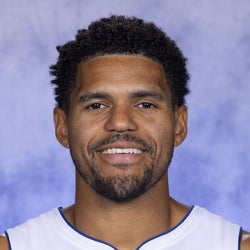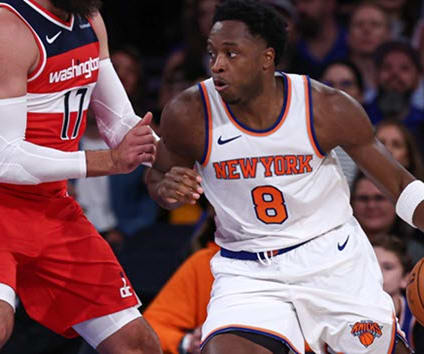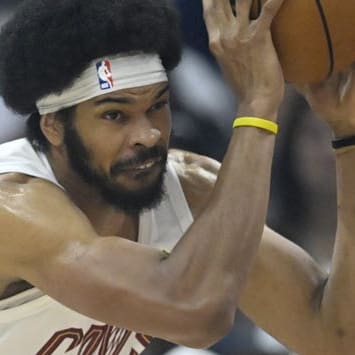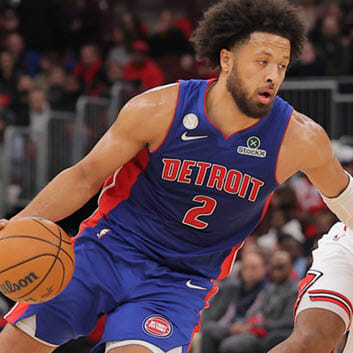2025 Stats
PTS
13.3
REB
4.4
AST
2.4
STL
0.8
BLK
0.2
ROS Projections
2025 Fantasy Outlook
Harris took a sizable step back in usage last season. It was his first year in Detroit, and Cade Cunningham emerged as a high-usage All-Star. That limited Harris' touches and often turned him into a corner three-point shooter for a team that desperately needed floor spacing. While the now-33-year-old was still a quality NBA forward, he was on the fringes of fantasy relevance. In his 31.6 minutes per game, he averaged 13.7 points and 1.2 threes on 48/35/86 shooting, 5.9 rebounds, 2.2 assists, 1.0 steals and 0.8 blocks. His potential this season is probably lower. Jaden Ivey will be returning following a season-ending injury, and Ausar Thompson projects to play more and see more touches. Harris should probably still be drafted in deeper formats, but fantasy managers in standard-sized leagues can probably avoid him to chase players with more upside. Read Past Outlooks

Logs 16 points and four treys
Harris logged 16 points (6-12 FG, 4-6 3Pt), two rebounds, three assists and two steals in 24 minutes during Sunday's 139-116 victory over the Kings.
ANALYSIS
Harris tied his season high for threes made in a game, a mark he has not reached since Nov. 29. After missing five games due to a hip injury, Harris has returned with solid production, averaging 13.0 points, 4.0 rebounds, 2.3 assists, 1.7 steals, 0.2 blocks and 1.7 threes across 27.0 minutes in his last six appearances.
Harris tied his season high for threes made in a game, a mark he has not reached since Nov. 29. After missing five games due to a hip injury, Harris has returned with solid production, averaging 13.0 points, 4.0 rebounds, 2.3 assists, 1.7 steals, 0.2 blocks and 1.7 threes across 27.0 minutes in his last six appearances.
NBA Per Game Stats
Per Game
Total
Per 36
NBA Per Game Stats
Loading Per Game Stats...
2025 NBA Game Log
2025
2024
2023
2022
2021
2020
2019
2018
2017
2016
2025 NBA Per Game Split Stats
Schedule
By Month
Starting/Off Bench
Days Rest
Vs Opp
By Result
2025 NBA Per Game Split Stats
Loading Split Stats...
Advanced Stats
Loading Advanced Stats...
Stat Review
2025
2024
2023
2022
2021
2020
2019
2018
2017
2016
How does Tobias Harris compare to other players?
This section compares his stats with all players from the previous three seasons (minimum 200 minutes played)*. The bar represents the player's percentile rank. For example, if the bar is halfway across, then the player falls into the 50th percentile for that stat and it would be considered average.
True Shooting %
56.4%
Effective Field Goal %
52.3%
3-Point Attempt Rate
38.3%
Free Throw Rate
23.5%
Offensive Rebound %
4.0%
Defensive Rebound %
13.9%
Total Rebound %
9.0%
Assist %
12.6%
Steal %
1.3%
Block %
0.9%
Turnover %
7.1%
Usage %
19.4%
Fantasy Points Per Game
24.5
Fantasy Points Per Minute
0.9
NBA Historical Fantasy Stats
Historical ADP
Loading Historical ADP...
Pistons Depth Chart
Our full team depth charts are reserved for RotoWire subscribers.
Subscribe Now
Pistons Rotation: Minutes Breakdown
Loading Pistons Rotation Data...
Average Fantasy Points
Minutes
FanDuel
DraftKings
Yahoo
FantasyDraft
Head2Head
Sorare
Average Fantasy Points are determined when Tobias Harris was active vs. non-active during the season. Click here to view average fantasy points for a different time period.
Loading Average Minutes...
Past Fantasy Outlooks
2024
2023
2022
2021
2020
2019
2018
2017
2016
2015
2014
2013
2012
2011
Harris signed a two-year deal with the Pistons in the offseason, ending his run with the 76ers, which lasted five and a half seasons. After averaging a career-high 20.0 points per game in 2018-19, Harris saw a steady decline in his production over the next four seasons before picking up the pace last year, averaging 17.2 points on 48.7 percent shooting, 6.5 rebounds, 3.1 assists and 1.0 steals per game. He also continued to provide solid shooting from long range, making it seven consecutive seasons hitting at least 35 percent from deep while averaging more than 1.0 made threes per game. Despite a respectable body of work through the regular season, Harris was significantly quieter in the playoffs with an average of only 9.0 points on 43.1 percent shooting. He reached the 20-point mark 27 times during the regular season, including four games with at least 30 points and a season-high 37 points on 14-for-25 shooting in a home win over the Kings on Jan. 12. Looking ahead, Harris faces a fresh start with an up-and-coming Pistons squad. He's in line to enjoy a role as a top offensive option, and as a result, he will have the opportunity to push for an increase in his scoring average compared to the past few seasons. However, Detroit's main focus will likely be the continued development of its young core, led by Cade Cunningham, Jaden Ivey, Ausar Thompson and Jalen Duren.
More Fantasy News

Goes off for 25 in win
Harris amassed 25 points (11-20 FG, 3-8 3Pt), three rebounds, one assist and one block over 35 minutes during Monday's 104-103 victory over the Celtics.
ANALYSIS
Subscribe now to instantly reveal our take on this news.
Subscribe now to instantly reveal our take on this news.

Not listed on injury report
Harris (undisclosed) isn't listed on the injury report for Monday's game against the Celtics.
ANALYSIS
Subscribe now to instantly reveal our take on this news.
Subscribe now to instantly reveal our take on this news.

Doesn't return Saturday
Harris (undisclosed) exited Saturday's 121-76 win over the Pacers in the third quarter and did not return.
ANALYSIS
Subscribe now to instantly reveal our take on this news.
Subscribe now to instantly reveal our take on this news.

Leaves for locker room
Harris (undisclosed) exited to the locker room in the third quarter of Saturday's game against the Pacers, Hunter Patterson of The Athletic reports.
ANALYSIS
Subscribe now to instantly reveal our take on this news.
Subscribe now to instantly reveal our take on this news.

Rips away five steals in win
Harris (hip) contributed 16 points (6-11 FG, 0-2 3Pt, 4-4 FT), seven rebounds, five steals and two assists across 29 minutes in Thursday's 108-105 win over the Suns.
ANALYSIS
Subscribe now to instantly reveal our take on this news.
Subscribe now to instantly reveal our take on this news.
Latest Fantasy Rumors

Linked to Brooklyn
Harris has emerged as a possible trade candidate as Detroit explores improving its title chances, Evan Sidery of Forbes.com reports.
ANALYSIS
The veteran forward could be included alongside Jaden Ivey in a potential deal for Brooklyn's Michael Porter. Harris' contract would be necessary for salary-matching purposes, while Ivey would be the intriguing young asset for the Nets to develop. Detroit's openness suggests Harris could be on the move if the right opportunity arises, but it's worth mentioning that there have been conflicting reports on Harris' availability.
The veteran forward could be included alongside Jaden Ivey in a potential deal for Brooklyn's Michael Porter. Harris' contract would be necessary for salary-matching purposes, while Ivey would be the intriguing young asset for the Nets to develop. Detroit's openness suggests Harris could be on the move if the right opportunity arises, but it's worth mentioning that there have been conflicting reports on Harris' availability.














